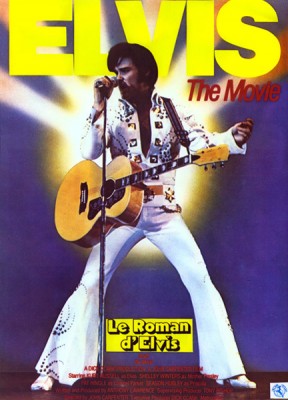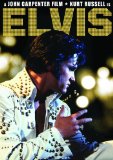| Reviews & Columns |
|
Reviews DVD TV on DVD Blu-ray 4K UHD International DVDs In Theaters Reviews by Studio Video Games Features Collector Series DVDs Easter Egg Database Interviews DVD Talk Radio Feature Articles Columns Anime Talk DVD Savant Horror DVDs The M.O.D. Squad Art House HD Talk Silent DVD
|
DVD Talk Forum |
|
|
| Resources |
|
DVD Price Search Customer Service #'s RCE Info Links |
|
Columns
|
|
|
Elvis
Originally an epic television movie running somewhere between 150-170 minutes in the United States, at least one, possibly several different shorter versions were prepared for overseas release. A 170-minute cut is what's on the DVD, but it's also presented in 1.78:1, 16:9 enhanced widescreen, resulting in many awkward compositions. (It was likely shot with 1.66:1 cropping in mind for its theatrical exhibition.) A few supplements are tossed in, but not the ones fans would expect or necessarily want.
poster for the European theatrical release version
The story opens in 1969, with a nervous Elvis (Russell) contemplating a return to live performing in a much-hyped, make-or-break engagement at the International Hotel in Las Vegas - the city where he famously bombed as a live act in 1956. As he waits to go onstage, the story of his life unfolds in flashbacks, from his humble childhood in Tupelo, Mississippi, living in a two-room shotgun shack with his father, Jesse (Bing Russell, Kurt's real-life character actor father in a good performance) and doting mother, Gladys (Shelley Winters). Early scenes establish Elvis's imaginary relationship with a stillborn twin brother, Jesse. In an imaginative touch, Elvis talks to Jesse as Elvis's own reflections in a stream or shadow on a wall.
Moving to Memphis, Elvis is a shy teenager whose natural talent as a singer lands him a contract with Sun Records while barely out of high school, and his quick if localized fame attracts the attention of shady but ingenious manager "Colonel" Tom Parker (a superbly cast Pat Hingle, but not in the film enough), who talks Elvis into breaking with Sun and signing with RCA, a national label. In short order Elvis appears on The Ed Sullivan Show and becomes an international sensation.
Beyond ending the story with Elvis's triumphant Vegas engagement and thus avoiding Presley's last, problem-plagued years culminating with his death in 1977, there are other obvious omissions throughout. There's no mention at all of Elvis's prescription drug abuse, his affairs with various women, his extreme paranoia or even the 1968 Comeback TV special that preceded his Vegas engagement. But the show does touch upon many other issues, such as Elvis's possessive, controlling nature, especially with regards to girlfriend and later wife Priscilla (Season Hubley, who married Russell soon after this was made), who was only 14 when their courtship began. Though depicted as perhaps more the innocent rube than he really was, Elvis is accurately portrayed as immature and at times unattractively childlike: he rents movie theaters and arcades for he and his pals but on a dime can be petulant and pouty.
The film works best when focusing on the intriguing relationship between Elvis and his mother. Each is trying so hard to please the other they can't see their obvious affection for one another. Earning unimaginable amounts of money, Elvis drowns his mother in elaborate gifts while she frets that he's working himself to death just to please her. Eventually this becomes a kind of vicious yet strangely poignant circle, a mother and son who dearly love one another yet who never feel entirely comfortable in each other's presence.
Kurt Russell, who as a child actor shared a brief scene with the real Elvis in It Happened at the World's Fair (1963), was 28 years old when he made this, and his rich psychological portrait erased a screen image personified by his Dexter Riley character in Disney's slapstick comedies (Now You See Him, Now You Don't, The Strongest Man in the World, etc.). It was also his fortuitous first teaming with John Carpenter, the director with which he is most associated. To his credit, Russell never comes off as a mimic, though he's got Elvis's hip swaggering and other gestures down pat, and despite the handicap of lip-synching to Ronnie McDowell's vocals.
The film is typical of its era, looking pricier than the average TV series episode with fits of lavishness, but whose overall ragtag appearance is still firmly stuck in TV Land. Dick Clark's company produced.
Video & Audio
As noted above, Elvis is presented in its longer television cut but in cropped widescreen like its overseas theatrical release. The framing looks awfully tight and unbalanced here and there - in one scene Gladys Presley's head is cut off at the neck for most of one shot. Still, it most likely was made with at least 1.66:1 cropping in mind, so the effect isn't too off-putting. The transfer looks okay but there are signs of damage to the original elements, including several seconds of notably unsteady frames. The Dolby Digital 2.0 mono audio is adequate and the disc is closed-captioned but with no subtitling or other audio options.
Extra Features
Vocalist McDowell and author Edie Hand talk about the show and Elvis himself in a so-so audio commentary track. "Bringing Elvis to Life" is a 1979 promo film featuring Carpenter and Russell. Elvis himself appears in American Bandstand excerpts, while a photo gallery rounds out the supplements. It's too bad Elvis biographer Peter Guralnick or Carpenter and Russell weren't persuaded to participate. That would have been something.
Parting Thoughts
Though dated and less electrifying than it seemed to be 30-odd years ago, Elvis is still well above average for what it is, and definitely worth a look for both Elvis followers and fans of the Kurt Russell-John Carpenter collaborations. Recommended.
Stuart Galbraith IV's latest audio commentary, for AnimEigo's Tora-san DVD boxed set, is on sale now.
|
| Popular Reviews |
| Sponsored Links |
|
|
| Sponsored Links |
|
|
| Release List | Reviews | Shop | Newsletter | Forum | DVD Giveaways | Blu-Ray | Advertise |
|
Copyright 2024 DVDTalk.com All Rights Reserved. Legal Info, Privacy Policy, Terms of Use,
Manage Preferences,
Your Privacy Choices | |||||||














